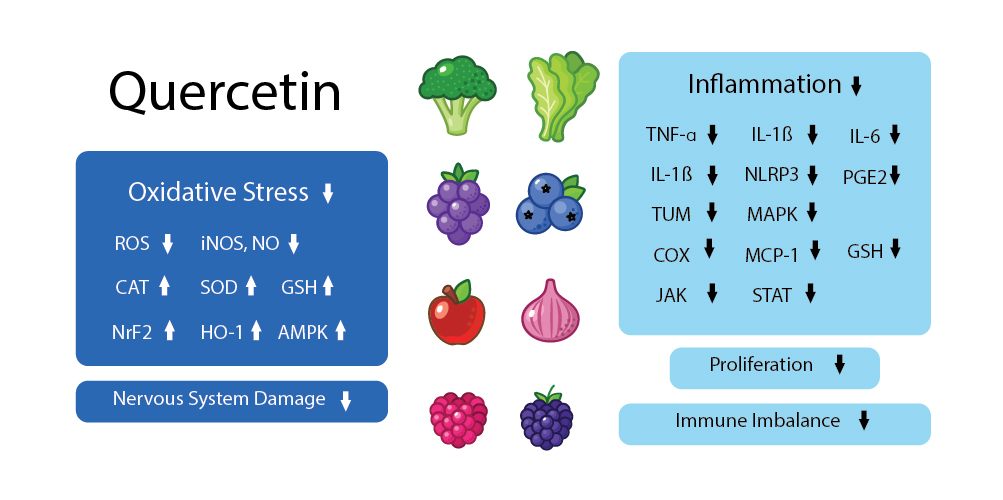Quercetin is a plant flavonoid (pigment) with potent antioxidant properties. It’s found naturally in many common foods, including onions (white, yellow, and red), red apples, dark-colored grapes, berries (cranberries and blueberries), broccoli (raw), and kale.
So the saying “An apple a day keeps the doctor away” may well be in reference to the broad range of health benefits of quercetin!
As one of the most abundant antioxidants in the diet, quercetin plays an important role in helping the body fight free radical damage — which (as mentioned in previous Learning Center blog posts) is linked to chronic diseases.
Some of the other functions of quercetin include:
- Anti-inflammatory.
- Neuro-protectant (protecting the nervous system from injury).
- Anti-microbial (killing or slowing the spread of micro-organisms).
- Anti-cancer agent.
- Immuno-modulator (calming the immune system).
Multiple studies have indicated a possible role for quercetin in auto-immune diseases, which are characterized by dysregulation (impairment) of the immune system and failure to recognize self. Such diseases include rheumatoid arthritis (RA), irritable bowel syndrome (IBS), multiple sclerosis (MS), systemic lupus erythematosus (SLE, an autoimmune disease), and atopic dermatitis (a condition that causes dry, itchy and inflamed skin).
Quercetin exerts powerful anti-inflammatory effects by:
- Inhibiting cytokine production such as TNF-alpha (tumor necrosis factor-alpha) and interleukins (IL-1beta, IL-6).
- Reducing cyclooxygenase/lipoxygenase expression.
- Maintaining the stability of Mast cells (a type of white blood cell found in the body’s connective tissues).
A glycosylated form of quercetin — rutin — has been shown to be beneficial in IBS and may play a role in treatment, while the neuro-protectant activity of quercetin has shown efficacy in MS.

Quercetin is felt to be a key factor in the cardio-protective properties of the CardioMetabolic or Mediterranean food plan. The well-known flavonoid, which has important antiviral properties as noted in this 2020 study, acts via the arachidonic acid metabolism pathway, which is where non-steroidal anti-inflammatory drugs (NSAIDs) exert their action. The study (by U.S. and U.K. researchers) points out that Vitamin C, another immunity powerhouse, and quercetin act synergistically in viral immunity, and may be part of the response needed to protect against COVID-19. Both vitamin C and quercetin appear safe at essentially all doses. Quercetin affects viral entry, viral replication, and protein assembly — all of these actions are augmented by vitamin C.
In 2007, it was discovered in this research published in Medicine & Science in Sports & Exercise that athletes who were on quercetin supplementation were protected from upper respiratory infections.
In 2009, there was an extensive review of the various roles quercetin may play in the energy production capabilities and other properties of malignancy that allow it to spread and grow. One particular study (published in 2019) proved that quercetin with irinotecan (a chemotherapeutic agent) showed benefit over irinotecan alone, suggesting future roles for quercetin in cancer treatment.
Quercetin also has been shown, as discovered in this 2021 study, to be beneficial in treating pre-metabolic syndrome: The slow increase in blood sugar levels, blood pressure, and cholesterol that can lead to diabetes, coronary artery disease, and heart attack. It’s believed the mechanism of action is through increasing adiponectin (a hormone involved in inflammation and formation of fatty deposits in blood vessels), decreasing leptin (a hormone produced by fat cells regulating appetite and fat storage), antioxidant activity, and reduction of insulin resistance.
A separate 2020 study, by Chinese researchers, indicates a possible role in the treatment of coronary disease by suppressing TNF-alpha-induced apoptosis (which has been implicated in a wide range of liver diseases) and inflammation by blocking inflammatory cytokines (proteins secreted by cells of the immune system, and that help regulate immune responses). Quercetin has also featured prominently in traditional Chinese medicine.
The role of quercetin could be enormous in overall health. Some of the mechanisms mentioned above of action require higher doses of this important flavonoid than can be achieved orally (through food and supplements). Still, a very safe and effective dose for the prevention of a variety of illnesses and conditions is 250-500 mg twice daily.
In our product line, quercetin is found in the full dose in OrthoMune and in natural D-Hist in a lower dose. For all your quercetin and immune system needs, contact Functional Medicine 411.













